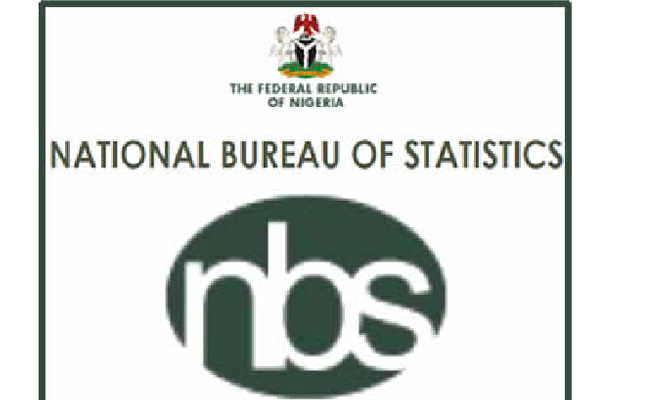COVID-19, borders closure, others jack up inflation in Nigeria

By Tunde Shorunke & Philip Clement
Consumer Price Index which is largely determined by the country’s rising food prices, rose to 14.89 per cent in November, representing a 0.66 per cent points, higher than the 14.23 per cent recorded in October 2020.
The National Bureau of Statistics (NBS) disclosed this in its November inflation report released on Tuesday.
The country’s inflation index has been largely influenced by the closure of land borders since 2019.
According to the report, the latest figure represents the highest inflation rate recorded in 34 months since January 2018, when the rate stood at 15.13 per cent.
Commenting on this development, a finance expert, Prof. Uche Uwaleke, said that the continuous impact of the Covid-19 pandemic, as well as border closure, largely contributed to the latest inflation figures released by the NBS.
He said: “NBS inflation numbers for November is a reflection of the lingering impact of COVID’19 as well as legacy issues of insecurity in many parts of the country, border closure, increase in VAT, the pump price of fuel, electricity tariffs, and Exchange rates.
“The rise in headline inflation by 14.89 per cent in November from 14.23 per cent in October despite the drop in core inflation over the same period clearly shows that the major challenge remains the rising cost of food as food inflation jumped from 17.38 per cent in Oct to 18.30 per cent in Nov.
“What this has shown is that inflationary pressure is caused primarily by non-monetary factors.
Therefore, fiscal authorities should be in the driving seat in the battle to rein in inflation.
Efforts in this direction should include tackling insecurity and ramping up measures to ensure food security”, he said Consequently, the NBS noted that rural inflation also increased by 14.33 per cent in November 2020 from 13.68 per cent which was in October 2020.
In one year period, Bauchi state recorded the highest inflation rate at 19.67 per cent, Kogi 19.81 per cent, and Zamfara 17.30 per cent.
On the other hand, Kwara State recorded the lowest headline year-on-year inflation at 12.24 per cent, followed by Delta State with 13.20 per cent, while Abia was put at 13.26 per cent.
Since the border closure in 2019, Nigeria’s inflation has been on the rise, with many experts believing that the aim of the border closure has not been achieved.
Food prices have been soaring which has made inflation to maintain an upward trend.
However, President Muhammadu Buhari has hinted that the country’s borders will soon be opened after grey areas of the concern with neighbouring countries has been sorted out.
But in an exclusive telephone chat with our correspondent, Head, Investment Research & Business Development, Pac holdings, Moses Ojo, acknowledged that the increase in the headline inflation in November is already expected, adding that crude oil inflation, border closure, hike in pump price, others are the major contributor to inflation.
“The increase in headline inflation for November is quiet expected looking at the major challenges faced by the economy in respect to the crude oil inflation, border closure, food insecurity in the northern part of the country which has disengaged farmers from accessing their farm.
“Farmer’s are not been able to harvest their crops which in turn, is leading to an increase in the price of food in the country.
Also, the increase in Value Added Tax (VAT) by the federal government from 5per cent to 7.5per cent is also a huge contributor.
The increase in pump price, instability of our exchange rate, hike in electricity tariff are also a major contributor to the increase in November inflation.
“These factors are also causing a lot of dislocation in the economy.” Speaking further on December economy outlook, he ascertained that the reduction in the pump price of petrol by the federal government which was meant to take effect on 14th of December, 2020 has not been adhered to by the marketers.
He acknowledged that full deregulation will play a long way which will revive Nigeria’s economy, where Nigeria National Petroleum Corporation (NNPC) won’t be the sole importer of petroleum products in the country.
“Crude oil prices gas now moved into $50- 51/barrels which is good news for Nigeria but, on the other hand, we should also be prepared for an increase in the pump price of petrol since the price of crude oil is the major determinant of petrol pump price in the country.
“Also on the issue of the border closure we’ve seen the promising report by the committee in charge of border closure and hopefully the president will take action as soon, but still with the promises doesn’t take any effect on the economy unless action is taken.”
Meanwhile, the Senate on Tuesday passed President Muhammadu Buhari’s Finance Bill 2020 transmitted to the National Assembly two weeks ago for consideration and passage.
The passage of the bill was a sequel to the consideration of a report by the Senate Joint Committee on Finance; Customs, Excise & Tariff; Trade and Investment; and Public Procurement.
According to the lawmakers, the Finance Bill 2020 specifically seeks to amend 17 key areas, which include: Capital Gains Act; Companies Income Tax Act; Industrial Development (Income Tax Relief ) Act; Personal Income Tax Act; Tertiary Trust Fund Act; Customs and Excise Duties Tariff; Value Added Tax Act; Stamp Duties Act; and Electronic Transaction Levy.
Other areas amended are; Federal Inland Revenue Service (Establishment) Act; Nigeria Export Processing Zone Authority Act; Oil and Gas Export Processing Zone Act; Crisis Intervention Fund; Unclaimed Funds Trust Fund; Companies and Allied Matters Act, 2020; Fiscal Responsibility Act; and Public Procurement Act.
READ ALSO: ‘Insecurity, prolonged border closure behind inflation hike to 14.23%’
President Muhammadu Buhari, in a letter dated 25th November 2020, which accompanied the Finance Bill during transmission, said its passage would support the implementation of the 2021 budget through key reforms to specific taxation, customs, excise, fiscal and other laws.
According to him, the proposed amendment to the bill seeks to: “adopt appropriate counter-cyclical fiscal policies to respond to the economic and revenue challenges precipitated by the decline in international oil prices, as well as the impact of the COVID-19 Pandemic on the Nigerian economy; “Reform extant fiscal policies to prioritize job creation, economic growth, socio-economic development, domestic revenue mobilization, as well as to foster closer coordination with Monetary and Trade Policies; “Provide fiscal relief for taxpayers by reducing the applicable minimum tax rate for two years consecutive years of assessment, as well as reforming the commencement and cessation rules for small businesses.”










